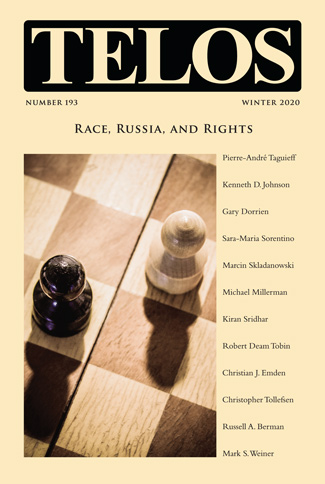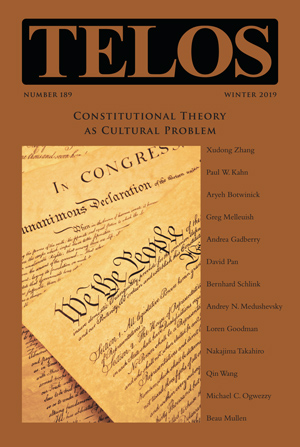By Telos Press · Friday, June 4, 2021 In today’s episode of the Telos Press Podcast, Camelia Raghinaru talks with Michael Millerman about his article “The Ethnosociological and Existential Dimensions of Alexander Dugin’s Populism,” from Telos 193 (Winter 2020). An excerpt of the article appears here. To learn how your university can subscribe to Telos, visit our library recommendation page. Print copies of Telos 193 are available for purchase in our store.
Listen to the podcast here.
Continue reading →
By David Pan · Friday, December 18, 2020 Telos 193 (Winter 2020): Race, Russia, and Rights is now available for purchase in our store. Individual subscriptions to Telos are also available in both print and online formats.
 What is not up for discussion? The answer to this question defines a political order, and the repressiveness of such an order will depend on where this boundary is set between the discussable and the undiscussable. But it is not as if more discussion necessarily means less repression. Certain topics—genocide, torture, slavery—definitely need to be off the table as legitimate political measures. Other topics—the choosing of rulers and historical facts—need to be discussable in order to avoid tyranny. In between lies a gray area whose definition will establish the character of each political order. Conversely, a lack of consensus on this issue will lead to political instability that goes beyond the content of political debates, indicating that the question of discussability coincides with the problem of political identity. This issue of Telos will consider three areas in which discussability has become the main issue, leading to implacable conflict. What is not up for discussion? The answer to this question defines a political order, and the repressiveness of such an order will depend on where this boundary is set between the discussable and the undiscussable. But it is not as if more discussion necessarily means less repression. Certain topics—genocide, torture, slavery—definitely need to be off the table as legitimate political measures. Other topics—the choosing of rulers and historical facts—need to be discussable in order to avoid tyranny. In between lies a gray area whose definition will establish the character of each political order. Conversely, a lack of consensus on this issue will lead to political instability that goes beyond the content of political debates, indicating that the question of discussability coincides with the problem of political identity. This issue of Telos will consider three areas in which discussability has become the main issue, leading to implacable conflict.
Continue reading →
By Norbert Bolz · Wednesday, December 2, 2020 When the historian Ernst Nolte formulated the thesis that Auschwitz was “the fear-induced reaction to the extermination processes of the Russian Revolution,” he was finished in the academic world. It was even of no help to him emphasizing that the copy was more irrational, more appalling and atrocious than the original. He was not forgiven the comparison since he seemed to call into question the singularity thesis, the incomparability of NS terror. That fit the taboo on totalitarianism theory. Right-wing and left-wing terror should not be mentioned in the same breath; National Socialism and International Socialism are not to be compared. And therefore all attempts to similarly work through the reign of terror by the Communists in its broad impact, as has been done with that of the Nazis, have been in vain. Of course, one would have to differentiate here. French intellectuals have undoubtedly been affected by the shocking reports by Koestler and Solzhenitsyn about the Moscow Trials and the Gulag. That was, at best, embarrassing for the German left. And so it should be no surprise that it celebrated Lenin’s 150th birthday—though under coronavirus conditions.
Lenin was the star of the Bolsheviks, who understood themselves to be the Jacobins of the twentieth century. He was undoubtedly an exceptionally gifted demagogue, but one should not imagine the Russian Revolution as resulting from a social movement; it was a project of intellectuals. The Bolshevik vanguard consisted of theorists, frequently emigrants, who had learned from Marx to use Hegel’s dialectic as a weapon. In this respect, the neo-Marxist bible History and Class Consciousness (1923) by Georg Lukács is still today unsurpassed. Here Hegel’s adroit dictum “all the worse for the facts” is taken seriously: more real than the facts is the totality as it presents itself from the standpoint of the proletarian class. In this way, dialectics becomes opium for the intellectuals.
Continue reading →
By Saladdin Ahmed · Monday, November 2, 2020 As the world becomes increasingly more focused on the second coronavirus wave and the American elections, Erdoğan’s mercenaries and army will most likely invade Northern Syria again in the coming days and weeks.
Erdoğan knows that no regional or global power will seriously challenge him if he occupies the rest of Northern Syria, also known as Rojava. During the last four years, he has seized every opportunity to execute his neo-Ottoman enterprise. He has openly recruited jihadis and occupied three strategic areas in Rojava. As the Syrian Kurds remain the most stubborn obstacle to his regional expansion southward, he has made his intentions to eliminate the semiautonomous administration in Northern Syria abundantly clear.
The Trump administration has little concern for the situation in Syria. Dismissing the Pentagon officials’ strong advice, Trump has given in to Erdoğan’s demands in Northern Syria more than once. Erdoğan secured Trump’s implicit approval to attack the Syrian Kurds about a year ago, during a dubious phone call between the two leaders. Given that things might change under a Biden administration, it is safe to assume that the opportunistic Erdoğan has already planned a devastating strike to knock out this secular, semiautonomous, multiethnic entity in Rojava.
Continue reading →
By Russell A. Berman · Thursday, April 9, 2020  Once upon a time, there was an illusion that the state would disappear. It was the fiction Marxists told each other at bedtime, and it was the lie of the Communists, once they had seized state power. For even as they built up their police apparatus and their archipelago of gulags, they kept promising that one day the state would eventually disappear. Once upon a time, there was an illusion that the state would disappear. It was the fiction Marxists told each other at bedtime, and it was the lie of the Communists, once they had seized state power. For even as they built up their police apparatus and their archipelago of gulags, they kept promising that one day the state would eventually disappear.
Of course, in a sense, they were right because Communism ended and so did the Communist states in Russia and Eastern Europe. Yet the death of those regimes is in no way an argument for the death of statehood itself.
The state is the expression of sovereignty, and sovereignty is the ability of national communities to decide their own fates. Such independence is far from obsolete, and certainly not for the countries on the eastern flank of the European Union. After years of Russian occupation, they have regained their state sovereignty. They will continue to insist on it, and rightly so.
Continue reading →
By Andrey N. Medushevsky · Thursday, January 2, 2020 Andrey N. Medushevsky’s “Law and Revolution: The Impact of Soviet Legitimacy on Post-Soviet Constitutional Transformation” appears in Telos 189 (Winter 2019), a special issue on constitutional theory. Read the full article at the Telos Online website, or purchase a print copy of the issue in our online store. Individual subscriptions to Telos are available in both print and online formats.
 The systematic investigation of the Russian revolutionary tradition in comparative, historical, and functional perspective provides the opportunity to understand its impact on the creation of the modern world and the contemporary social and political system. This article discusses the meaning, formation, and evolution of the Soviet project—the concept and practice of social and legal reorganization in Russia inspired by Marxist philosophical ideas and fulfilled during the period from the Bolshevik Revolution of 1917 until the collapse of the Soviet regime in 1991. Employing a cognitive theoretical approach in historical studies, the author examines the role of Communist myth in the formation of the Soviet state, the ideological and legal grounds of one-party dictatorship, the nature of nominal constitutionalism, and the role of institutional continuity in the formation of the current political system. He shows the place of the permanent grounds (ideology, nominal constitutionalism, and dictatorial impetus) as well as the place of changing parameters of the project (Soviet, federative, and class-oriented regulation) regarding their formal and informal influence on the political regime’s legitimacy and the cumulative impact on the system’s transformation and failure. In this context, the author discusses the evolution of the legitimating formula of the political regime from Tsarist times to the collapse of the Soviet regime, as represented in ideological programmatic, nominal Soviet constitutionalism (1918, 1924, 1936, and 1977 Soviet constitutions) and changing practices of the social mobilization. That makes possible the general evaluation of the revolutionary heritage and its influence on the current post-Soviet ideological priorities, political system, legal transformation, and prospects for its modernization. The systematic investigation of the Russian revolutionary tradition in comparative, historical, and functional perspective provides the opportunity to understand its impact on the creation of the modern world and the contemporary social and political system. This article discusses the meaning, formation, and evolution of the Soviet project—the concept and practice of social and legal reorganization in Russia inspired by Marxist philosophical ideas and fulfilled during the period from the Bolshevik Revolution of 1917 until the collapse of the Soviet regime in 1991. Employing a cognitive theoretical approach in historical studies, the author examines the role of Communist myth in the formation of the Soviet state, the ideological and legal grounds of one-party dictatorship, the nature of nominal constitutionalism, and the role of institutional continuity in the formation of the current political system. He shows the place of the permanent grounds (ideology, nominal constitutionalism, and dictatorial impetus) as well as the place of changing parameters of the project (Soviet, federative, and class-oriented regulation) regarding their formal and informal influence on the political regime’s legitimacy and the cumulative impact on the system’s transformation and failure. In this context, the author discusses the evolution of the legitimating formula of the political regime from Tsarist times to the collapse of the Soviet regime, as represented in ideological programmatic, nominal Soviet constitutionalism (1918, 1924, 1936, and 1977 Soviet constitutions) and changing practices of the social mobilization. That makes possible the general evaluation of the revolutionary heritage and its influence on the current post-Soviet ideological priorities, political system, legal transformation, and prospects for its modernization.
Continue reading →
|
|

 Once upon a time, there was an illusion that the state would disappear. It was the fiction Marxists told each other at bedtime, and it was the lie of the Communists, once they had seized state power. For even as they built up their police apparatus and their archipelago of gulags, they kept promising that one day the state would eventually disappear.
Once upon a time, there was an illusion that the state would disappear. It was the fiction Marxists told each other at bedtime, and it was the lie of the Communists, once they had seized state power. For even as they built up their police apparatus and their archipelago of gulags, they kept promising that one day the state would eventually disappear. 







